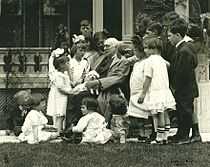Little Orphant Annie (1918 film)
| Little Orphant Annie | |
|---|---|
|
Film still | |
| Directed by | Colin Campbell |
| Produced by | William Nicholas Selig |
| Written by |
James Whitcomb Riley (story) Gilson Willets (scenario) |
| Starring |
Colleen Moore Tom Santschi Harry Lonsdale Eugenie Besserer |
| Cinematography | Charles Stumar |
Production company | |
| Distributed by |
Pioneer Film Corporation (1918) World Film (1919) |
| Country | United States |
| Language | Silent (English intertitles) |
Little Orphant Annie is a 1918 American film adaptation of the famous and beloved James Whitcomb Riley poem of the same title, produced by William Selig and starring Colleen Moore in her first starring role, just one year after her arrival in Hollywood.
Excerpt from Little Orphant Annie
- Little Orphant Annie’s come to our house to stay,
- An’ wash the cups an’ saucers up, an’ brush the crumbs away,
- An’ shoo the chickens of the porch, an’ dust the hearth, an’ sweep,
- An’ make the fire, an’ bake the bread, an’ earn her board-an’-keep;
- An’ all us other children, when the supper things is done,
- We set around the kitchen fire an’ has the moistest fun
- A-list’nin to the witch-tales ‘at Annie tells about,
- An, the Gobble-uns ‘at gits you
- Ef you
- Don’t
- Watch
- Out![1]
- Watch
- Don’t
- Ef you
Plot
Annie, left orphaned after the death of her mother, goes to live in an orphanage where she tells her fellow orphans stories of ghosts and goblins. The matron of the orphanage finds Annie's closest relative, the abusive Uncle Thomp. Her uncle who puts her to hard work doing hard labor on his farm, belittling her all the while. Big Dave, a neighbor and tough cow-poke sees this and comes to her aid. Dave becomes her protector. Eventually Annie goes to live with Squire Goode and his large family. There, she entertains the children of the household with her stories, but sees her abusive aunt and uncle as her chief tormentors. She tells stories of how the goblins will take away the children if they are not good. Each story she tells is illustrated. War breaks out and Dave, who Annie adores, enlists. Uncle Thomp, hearing that Dave has been killed in action, takes pleasure in telling Annie the news. Broken-hearted, Annie falls ill and dies in bed, surrounded by family.
Cast
- Colleen Moore - Annie
- Tom Santschi - Dave Johnson
- Harry Lonsdale - Annie's Uncle
- Eugenie Besserer - Mrs. Goode
- Doris Baker - Orphan
- Baby Lillian Wade - Orphan (as Lillian Wade)
- Ben Alexander - Orphan
- Billy Jacobs - Orphan
- George Hupp - Orphan
- James Whitcomb Riley - Himself (archive footage)
- Mae Gaston - Annie's Mother
- Lillian Hayward - Aunt Elizabeth
- Lafe McKee - The Good Squire
- Jean Stone - Little Annie as a Child
Background

The film appears to have been extensively re-written and re-edited. Some outlines have Annie dying in the end and being reunited in heaven ("The Good World") with her mother, where she is wedded to Dave. Another version (available on DVD) has her fall ill, only to recover and learn Thomp's news was only a bad dream.[2] In her autobiography Silent Star, Colleen wrote that she was contracted to work on Little Orphant Annie for Selig, but the first film shot was A Hoosier Romance. The story is framed with film of the poet himself reading to children. The material had been filmed by Selig Polyscope for an earlier commissioned work.[3] As the film currently exists, only two of the stories she tells (from the original poem) are illustrated. Additional film material has been found, and the film is awaiting restoration. The special effects (super-impositions and lap dissolves) and makeup effects were impressive for their time, allowing the viewer to see the visions as Annie saw them.
References
- ↑ Little Orphant Annie, by James Whitcomb Riley, illustrated by Ethel Franklin Betts, the Bobs-Merrill Company, 1892, 1898, 1900, 1903, 1907, 1908, William Selig Collection, folder 95. (Printed with Billy Miller’s Circus-show)
- ↑ Folders 95 - 98, William Selig Collection, Margaret Herrick Library, Academy of Motion Picture Arts and Sciences.
- ↑ The Indiana Centennial, 1916: A Record of the Celebration of the One Hundredth Anniversary of Indiana's Admission to Statehood, Indiana Historical Collections, Volume 5, by the Indiana Historical Bureau and Harlow Lindley, 1919, page 31.
Footnotes
- Jeff Codori (2012), Colleen Moore; A Biography of the Silent Film Star, McFarland Publishing,(Print ISBN 978-0-7864-4969-9, EBook ISBN 978-0-7864-8899-5).
_-_1.jpg)